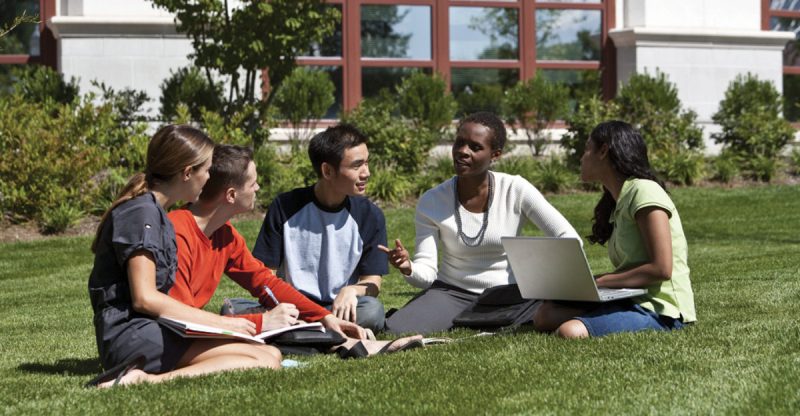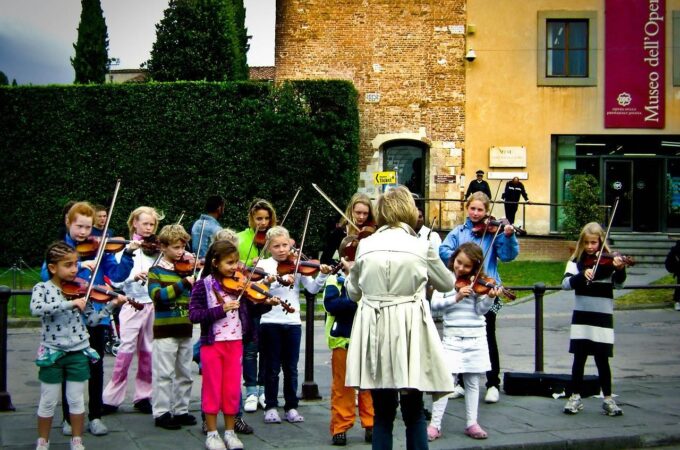
Benefits of Outdoor Learning
Hippocrates, one of the founders of medicine, said that measured rhythm of life, sports and walking around in the open air are the keys for long and healthy life. Unfortunately, today the vast majority of people spend their time mainly indoors, the interaction between human and nature is negating from year to year. At the same time, scientists report on the extremely useful impact of nature on human’s physical and cognitive functions.
Learning in nature has enormous advantages over “normal” indoor classes, it’s especially useful for students who spend all day in classrooms, libraries, laboratories, etc. Studying outdoors, particularly in the park or forest, alleviates nervous tension, relaxes and enhances student’s concentration during class and after it – all that is not a complete list of the benefits of outdoor activities.
Outdoor education in the city has a lesser impact on health since air oxygen concentration is low there. Air in big cities is highly polluted with carbon dioxide and other impurities (smog, exhaust fumes, etc). Another, more implicit but still devastating product of modern civilization is urban noise. It badly affects the brain disrupting its oxidizing and restorative function. The noise facilitates psychological disease progression, damages nervous system, shatters peace of mind.
A forest is a natural air purifier that emits oxygen and absorbs gases that are harmful for human. Bird songs, fresh and rich in oxygen air, calming atmosphere are perfect conditions for education and any other outdoor activities.
Outdoors activities influence learning engagement
For a long time, scientists have studied the positive impact of being outdoors on different processes occurring in a human body and mind. A short walk or even 10 minutes of sitting in the open air helps to relieve stress and get focused.
An interesting pattern was discovered by American researchers. As it appears, students become more engaged and concentrated on learning after having outdoor activities. According to common estimates, optimal attention span for adults and teenagers ranges from 20 to 25 minutes, after that period person becomes distracted, but as research shows, outdoor classes help to keep students focused for 2 hours and even more.
The team from Illinois University has conducted research on the impact of nature on the learning process. In order to see the changes in student engagement in an indoor class after the outdoor one, during 10 weeks researchers conducted 1 lesson a week in the open air. The classes took place in a large park with trees and lawns near the school. Also, there was a monitoring group of students who attended only indoor classes.
After each outdoor or indoor lesson, the team of researchers observed and learned classroom engagement: whether students were focused or distracted. Independent observers counted how many times teachers had to stop classwork and direct students’ attention back; in addition, the level of engagement was estimated by photos taken during classes; observers didn’t know if students were shot after or before the outdoor lesson.
Attention, motivation and stress as major factors in learning
Attention as a cognitive process is extremely important in student involvement. Systematic presence in nature or even contemplation of green lawn and line of trees outside the window may have positive effects on brain activity. According to the theory of attention restoration, being outdoors stimulates mental activity by deliberate direction of attention to rest. Thus, after relaxation our ability to confine attention renews. This effect was triggered by experiments. Students took strolls in a green environment and in urban settings; during classes they occasionally looked through the window at greenery or barren schoolyards. Results showed that any interaction with nature in one way or another increased students’ capacity for focusing on the following indoor lesson.
Motivation is another important asset to student involvement in learning. Interesting that hardly anyone conducted research on examining effects of measured doses of outdoor classes. In practice, school-age children, as well as adults, prefer lessons in the air, and there is an indicator that nature-based lessons strengthen motivation in learning at school and other educational institutions. Significantly, students who mostly lack motivation indoors, usually experience the strongest positive effect of nature-based education.
Stress is negative but still crucial factor in student involvement. It’s clear that prolonged stress may result in poor academic achievement. Experimental work shows that contact with nature reduces anxiety. Outdoor classes bring down levels of self-reported and physiological measures of stress. After a week of classes held in a forest, students showed a lot better heart rates and diurnal rhythms in cortisol (stress hormone) production than a comparison group of students that attended only “normal” lessons.
End results showed that after classes held in the park students were more focused, hard-working and calm in subsequent lessons. Teachers had to redirect attention and explain stuff less frequently. Apparently, even a quick look through the window at greenery helped to concentrate. Although some teachers insist that outdoor activities only distract students from learning.
Calculation and analysis showed that after outdoor lesson more than 80% of students were fully engaged in classwork, moreover they stayed focused a lot longer. For at least 2 hours, on average, the class were expressing interest in studying, whether it was listening to lecture or writing works for a paper writing websites.
Since the class members didn’t change nor did the teacher and curriculum, we can conclude that boost of efficiency in the studying process is caused by the change of scenery in favor of outdoor activities.
Conclusion
So why is it important to build experience outside the classroom? Besides the positive effect on students’ learning capacities, studying outdoor is important in terms of environmental conservation. Anthropogenic environmental change turns into the undeniably thrilling issue, outdoor education may help with raising of a new generation of environmentalists. Nature-based lessons at school may play a key role in shaping pro-environmental attitudes and behavior in adulthood.
Importantly, the success of outdoor education also depends on the level of organization, i.e. lesson plan, degree of teacher professionalism, chosen location, air temperature, weather conditions, etc. Ultimately, the quality of learning depends on both the teacher and students – it requires expert knowledge and enthusiasm at one side and active participation at the other side. You may even need some form of PR from GK & Partners. This will help show off your institution in a good light as well as create a good media presence.




